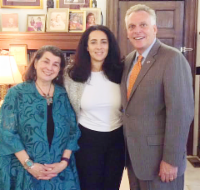Following a special April 6 screening of Rosenwald at Hampton University, Virginia Governor Terry McAuliffe announced a National Park Service grant to help Virginia identify and survey the sites of former Rosenwald schools. The Virginia Department of Historic Resources and Preservation Virginia will receive $50,000 from the Underrepresented Communities Grant Program to support its longstanding effort to properly recognize the schools with state historical markers and designations to the Virginia Landmark Register and National Register of Historic Places.
The screening was organized by Ms. Brett Glymph, the Director of Virginia Outdoor Foundation. Mr. Bill Thomas, Hampton’s University Associate Vice President, introduced filmmaker Aviva Kempner who talked about the film and answered questions. President William R. Harvey of Hampton University introduced the Governor who made the announcement. President Harvey hosted a lovely reception afterwards. The screening was the latest showing of Rosenwald screenings scheduled for the Southern tour of Historical Black Colleges, supported by Reva and David Logan Foundation.

Left to right: Filmmaker Aviva Kemper with Brett Glymph, Director of Virginia Outdoor Foundation and
Virginia Governor Terry McAuliffe
The Governor’s office released a statement. “In Virginia and beyond, ignorance has been used as a weapon of oppression. Education has always been the salvation of the oppressed,” said Governor Terry McAuliffe. “By building schools, Rosenwald and Washington confronted racism at its core and laid a foundation for the Civil Rights Movement. The legacy of their labors continues to shape our Commonwealth and country today.”
The Rosenwald Rural Schools Initiative provided matching grants to support the construction of educational facilities designed by professors from the all-Black Tuskegee Institute. By requiring buy-in from both white school boards and Black communities, the Initiative ensured that, once built, the schools would have the resources and support necessary to succeed. A 2011 study by the Central Reserve Bank of Chicago found that the Rosenwald Rural Schools Initiative achieved significant educational gains in the Southern Black community, with the largest impact seen in the most disadvantaged areas.
“The history we chose to recognize is as much an illustration of who we are as who we were,” said Secretary of Natural Resources Molly Ward. “This grant will allow us to continue the important work of bringing much-deserved focus to these unfairly forgotten schools and their untold stories.”
“This generous support from the National Park Service enables the Department of Historic Resources to continue its efforts to recognize and protect properties associated with important, yet often ignored, chapters of the Commonwealth’s rich history. Partnering with communities to identify and record properties associated with diverse and heretofore under-represented constituencies is among our highest priorities,” said Virginia Department of Historic Resources Director Julie Langan.
“Rosenwald Schools were centers not just for learning, but for neighborhood investment and pride in many African American communities across the Commonwealth,” said Preservation Virginia CEO Elizabeth Kostelny. “Preservation Virginia looks forward to working with the Department of Historic Resources and former Rosenwald communities to heighten awareness about this important but often overlooked history.”


